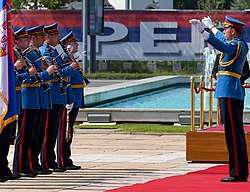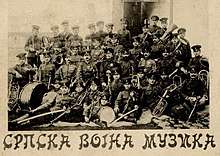Serbian Guards Unit Band
The Representative Band of the Serbian Guards Unit of the Serbian Army (Serbian: Репрезентативни Оркестар Гарда Србије) is the official representative brass band of the Serbian Guards Unit. It is stationed in the capital of Belgrade to provide musical support to the President of Serbia and the Serbian Government.
| Serbian Guards Band | |
|---|---|
| Гардијски оркестар Србије | |
 The band at the Palace of Serbia during the visit of Petro Poroshenko in July 2018. | |
| Active | 1831 |
| Country | |
| Allegiance | President of Serbia |
| Branch | |
| Type | Military Band |
| Part of | Serbian Guards Unit |
| Headquarters | Belgrade |
| Nickname(s) | Guards Band |
| Commanders | |
| Notable commanders | Dragutin Pokorný (1921-1924)[1] |
History

In spring 1831 the "Serbian Prince’s Band", which was raised that year, became a part of the bodyguard of the Prince of Serbia (then-Miloš Obrenović). The chief of the band was bandmaster Josip Slezinger who was sent to Kragujevac by his brother Jevrem, the chief of the Šabac Administrative Centre. Dressed in ornate uniforms, the bands performed during plays in the theatre of Prince Joakim Vujic. During that period many Serbian newspapers and other media organizations published articles in which they compared the band with the most experienced on the European continent, including the French Republican Guard Band and the Band of the Grenadier Guards. In 1899, Serbian composer, conductor, and pedagogue Stanislav Binički began collaborating with the Belgrade Military Band and at the beginning of the 20th century, he founded the "Royal Guard" band on the basis of the Prince's Band, being the only professional band at that time in the country.[2][3][4] During his time with the band, he introduced its members to a more classical repertoire with pieces such as Franz Schubert's 8th Symphony and Antonín Dvořák's Slavonic Dances.[5]
On 16 May 1945, the Band of the Serbian Guard was re-founded by order of Marshal Josip Broz Tito. It continued the tradition pioneered by partisan bands in popularizing songs and music from the National Liberation War and became a cultural institution that developed a wide artistic culture throughout the Yugoslav People's Army. The task of the band at the time was to perform protocol duties at the highest of bodies in the Socialist Federal Republic of Yugoslavia on behalf of the JNA.[6] With the collapse of the SFRY, the Guard Orchestra remained within its scope of work. Protocol tasks at the highest state level, representation of the Federal Republic of Yugoslavia, Serbia and Montenegro, the Republic of Serbia and the Armed Forces both at home and abroad have remained the band's primary responsibility to the Serbian people.
Traditions

A lot of the pieces in the repertoire of the band are written by composer and pedagogue Stanislav Binički, who wrote common marches such as the Gardiski marš, Marš na Drinu and the Paradni Marš. Unlike the rest of the army, the band does not perform the traditional high step and before 1975, the goose step when on parade.
Uniform
Royal blue and black with red trim are the colors used in the full dress uniform worn by its musicians, which are also worn by personnel of the Guards Unit. The Band's musicians, as well as the drum major, wear the peaked cap with this uniform.
Ensembles
In accordance with organizational and forming needs, it was increased and decreased numerically, which also led to the change of its name. As a rule, the best musicians who played on two or more instruments formed part of the band. Thanks to this fact, as well as to the needs indicated, the Band can be organized into the following ensembles:
- Concert band
- Symphony orchestra
- Chamber orchestra
- Chamber brass, woodwind or string ensembles
- Big band/disco orchestra
Notable activities
- Performed at the opening of the Serbian Ossuary of Belgrade Defenders (1914-1918) at the Belgrade New Cemetery in the presence of Presidents Aleksandar Vucic and Emmanuel Macron on 15 July 2019. During the ceremony, it performed famous songs such as Tamo daleko.[7]
- Non-Aligned Movement Summit in 1961 and 1989.
- Public holidays in Serbia
- Military parades
- "Parade 85" on Bulevar kralja Aleksandra
- Belgrade Military Parade on Nikola Tesla Boulevard on 16 October 2014, during the 70th anniversary of the liberation of Belgrade.
- "The Defence of Freedom" Victory Day Parade in the city of Niš in Southern and Eastern Serbia.
- Military tattoos
- Liege Festival of Military Bands marking the centenary of the outbreak and end of World War I (2014 and 2018)[11][12]
- 1984 Winter Olympics
- Vukov sabor
- Arrival ceremonies at the Palace of Serbia
- Guards Day
- Day of the Serbian Army[13]
List of conductors
Since its founding in 1945, the director of the Guards Band have been:
- Tomaž Zajc (1945-1948)
- Iso Dracula (1948-1955)
- Gvido Uchakar (1956-1963)
- Gojko Bošnjak (1963-1972)
- Mihailo Petras (1972-1973) (First term)
- Franc Klinar (1973-1977)
- Mihailo Petras (1977-1984) (Second term)
- Ilija Ilijevski (1984-1992)
References
- https://www.academia.edu/11415740/%D0%A1%D0%A0%D0%9F%D0%A1%D0%9A%D0%95_%D0%92%D0%9E%D0%88%D0%9D%D0%95_%D0%9C%D0%A3%D0%97%D0%98%D0%9A%D0%95_%D0%A3_%D0%97%D0%95%D0%9C%D0%89%D0%90%D0%9C%D0%90_%D0%A1%D0%90%D0%92%D0%95%D0%97%D0%9D%D0%98%D0%9A%D0%90_%D0%A2%D0%9E%D0%9A%D0%9E%D0%9C_%D0%92%D0%95%D0%9B%D0%98%D0%9A%D0%9E%D0%93_%D0%A0%D0%90%D0%A2%D0%90_1916_1918_SERBIAN_MILITARY_BANDS_ORCHESTRAS_IN_ALLIED_COUNTRIES_DURING_THE_GREAT_WAR_1916_1918_
- http://www.vs.rs/en/article/AF8F3BDCED8211E4ABAB00163E135070/guard-representative-orchestra
- Mullen, John (2018-09-18). Popular Song in the First World War: An International Perspective. ISBN 9781351068666.
- Ковачевић Крешимир и сарадници „Музичка енциклопедија” Југославенски лексикографски завод Загреб 1971.
- Tomašević 2009, p. 37.
- Рацков, Никола (1990). 45 година са вама Репрезентативни оркестар гарде. Београд: Музичко одељење ССНО.
- http://www.significantcemeteries.org/2019/07/president-emmanuel-macron-visiting-new.html?m=1
- http://www.vs.rs/sr_cyr/vesti/883BBC73188311E8A3510050568F6690/promenadni-defilei-vojnih-orkestara-i-prikaz-naoruzanja-po-gradovima
- "Наступ Репрезантивног оркестра гарде у Модени".
- http://www.politika.rs/scc/clanak/166209/%D0%94%D1%80%D1%83%D1%88%D1%82%D0%B2%D0%BE/%D0%93%D0%B0%D1%80%D0%B4%D0%B8%D1%98%D1%81%D0%BA%D0%B8-%D1%81%D0%B2%D0%B8%D0%BD%D0%B3-%D1%83-%D0%91%D1%80%D0%B5%D0%BC%D0%B5%D0%BD%D1%83
- "Наступ Репрезентативног оркестра гарде у Лијежу".
- http://www.mod.gov.rs/eng/13017/reprezentativni-orkestar-garde-zadivio-belgiju-13017
- http://www.mod.gov.rs/cir/10912/promenadni-defilei-vojnih-orkestara-povodom-dana-vojske-10912